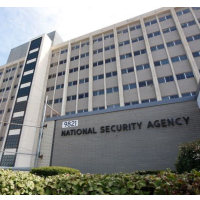NSA Strives to Restore 100% Coverage of Phone Calls as in the Days of George W. Bush
 NSA headquarters (photo: Charles Dharapak, AP)
NSA headquarters (photo: Charles Dharapak, AP)
If you’re concerned about the privacy of your phone calls, take heart: There’s less than a 30% chance the federal government is tracking them…for now.
The National Security Agency is unable to track all calls because of increased use of cellphones and fewer land lines, according to The Washington Post. The 30% figure is a significant drop from 2006, when almost all phone calls were tracked. Now, the agency wants to increase the number of calls on which it receives data.
The public learned of the call-tracking program as a result of leaks by former NSA contractor Edward Snowden. According to the program guidelines, the agency sweeps up only “metadata” from the phone conversations. That includes the phone numbers and the time and length of the calls, but does not include the names of the phone subscribers or the content of the conversations.
The NSA is getting ready to seek court orders for the wireless companies that currently do not turn over call data—Verizon Wireless and T-Mobile—to force them to do so. Administration officials have defended the move to increase the coverage of the program. “If you’re looking for the needle in the haystack, you have to have the entire haystack to look through,” Deputy Attorney General James Cole told Congress last July.
There are other reasons for the gap between the number of calls made and those swept up by the NSA. Cell phone data contains information that the NSA is forbidden to collect. The NSA must establish a protocol to ensure that they receive only the information to which they’re entitled. Some telecom industry officials also say that Internet calls have not been included in the sweeps.
Some reforms of the system have been proposed. In a speech last month at the Justice Department, President Barack Obama said he wants the NSA to get approval of the Foreign Intelligence Surveillance Court (FISC) before accessing records of a number that has a suspected link to terrorism, except in emergencies. He also wants analysts limited to pulling up numbers two levels removed from the suspect number. Previously, analysts could go out three levels.
The mining of phone call data was begun by the George W. Bush Administration in 2001 in the wake of the September 11, 2001, terrorist attacks. It came under the authority of the FISC in 2006. By that time, coverage was “closer to 100” percent, an unnamed official told The Washington Post.
Since then, there has been criticism of the program from at least one judge on the court. According to documents released last year, The NSA went through phone records not linked to terrorism “on a daily basis,” according to FISC judge Reggie Walton. The judge called the searches “a flagrant violation” of the court order.
NSA officials say they make only a few hundred queries each year into the call database, which contains information on billions of calls. Those queries, NSA officials say, are based on “reasonable, articulable suspicion” that a telephone number is connected to terrorism.
Another FISC judge, Claire V. Eagan, released an opinion last year that ruled the NSA monitoring of calls was constitutional, and that none of the telecom companies had objected when ordered to turn over data.
-Steve Straehley
To Learn More:
NSA is Collecting less than 30 Percent of U.S. Call Data, Officials Say (by Ellen Nakashima, Washington Post)
N.S.A. Program Gathers Data on a Third of Nation’s Calls, Officials Say (by Charlie Savage, The New York Times)
Documents Reveal “Flagrant Violations” of Privacy Rights by Bush-Era NSA (by Noel Brinkerhoff and Danny Biederman, AllGov)
FISA Court Reveals Why It Allowed NSA to Log Americans’ Calls, Claims Telecoms Didn’t Protest (by Noel Brinkerhoff and Danny Biederman, AllGov)
- Top Stories
- Unusual News
- Where is the Money Going?
- Controversies
- U.S. and the World
- Appointments and Resignations
- Latest News
- Musk and Trump Fire Members of Congress
- Trump Calls for Violent Street Demonstrations Against Himself
- Trump Changes Name of Republican Party
- The 2024 Election By the Numbers
- Bashar al-Assad—The Fall of a Rabid AntiSemite






Comments